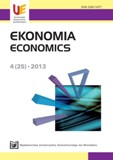Zaufanie i kapitał społeczny – uwarunkowania kulturowe, instytucjonalne czy indywidualne? Wnioski z porównań międzynarodowych
Trust and social capital – cultural, institutional or individual underpinnings? Results from international comparisons
Author(s): Maria LissowskaSubject(s): Economy
Published by: Wydawnictwo Uniwersytetu Ekonomicznego we Wrocławiu
Keywords: social capital; trust; transition
Summary/Abstract: The paper is devoted to the subject of social trust and its relationship to social capital. It intends to answer the question to what extent and why the level of trust to unknown members of the society, being the principal element of the social capital, is different across European countries. The first part of the paper is devoted to the review of definitions linked to social capital, trust and trustworthiness. Among many definitions of social capital for the needs of this paper the following one, coming from [Robison et al. 2002, p.6] was adopted. “Social capital is a person’s or group’s sympathy toward another person or group, that may produce a potential benefit, advantage, and preferential treatment for another person or group of persons beyond that expected in an exchange relationship”. The essential importance of social trust for social capital was underlined. The different hypothetical factors potentially underpinning the level of social trust were indicated, among others: quality of institutions functioning in a given society, cultural norms and personal features of the individual citizens. To answer the question about the differentiation of trust and its underpinnings in European countries, the data coming from the European Social Survey for 2006 were used. In the beginning, on the basis of the features potentially correlated with social capital, the European countries were partitioned into three groups. The first group contained mostly Western European countries, the second – Scandinavian countries with very high social trust but without high preference for fairness, and the third one – Eastern (and partly Southern) European countries with very low trust and rather high preference for fairness. The level of social trust was the feature differentiating those groups in the strongest way. In the next step of the research, using the hypotheses formulated in the literature, the degree of correlation between social trust and its hypothetical underpinnings was analysed. This research revealed that the strongest underpinnings for the whole group of European countries stemmed from the assessment of political institutions and of the state of economy, and, next, from the assessment of respondent’s control of their life. The levels of those features were highly differentiated among the groups of countries previously distinguished. In particular, low assessment of political institutions and of the state of the economy and low optimism and of control on one’s life seem to contribute to low social trust in post-socialist countries.
Journal: Ekonomia
- Issue Year: 2013
- Issue No: 25
- Page Range: 179-196
- Page Count: 18
- Language: Polish

